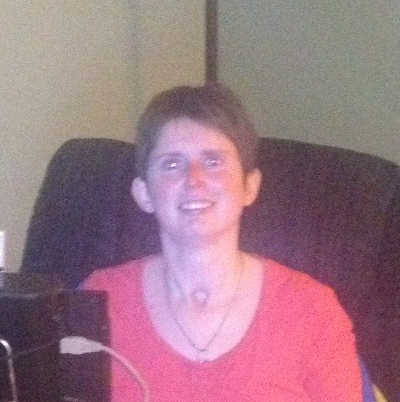At the age of 30, Ann Johnson was eight years into her career at Luther College, where she taught physical education and math and coached girls’ volleyball and basketball. “When I was a high school student, I loved playing sports! I was always angry that girl athletes didn’t get to experience a Luther Invitational Tournament environment, so when I started teaching at Luther, I started Luther Invitational Volleyball Tournament with Mark Leupold. I made the whole school come out and cheer for those girls!”
Johnson was enjoying her life with a 13-month-old daughter, an eight-year-old stepson and a 26-month-old marriage, when she experienced a rare brainstem stroke. “Overnight, everything was taken away from me,” she writes.
The stroke left her with Locked-in Syndrome (LIS). “LIS is just like it sounds. You’re fully cognizant, you have full sensation, all five senses work, but you are locked inside a body where no muscles work. I learned to breathe on my own again, I now have full neck movement, my laugh returned, I can cry and read, and, over the years, my smile has returned, and I am able to wink and say a few words.” Johnson communicates mainly by using a head mouse to type on a computer.
Thirteen years after her stroke, Johnson was deeply moved by the Humboldt Broncos bus crash. A few days after the tragedy, there was a call on the news for trauma counsellors. “It woke me up! I thought, ‘That’s something I can do,’” she recalls. She communicated her new plan to be a counsellor to her case worker, who suggested she find an introductory counselling class online to see if she liked it. Within a day, Johnson had found a course through Athabasca University and was in contact with its disability office.
“I had minimal computer skills and, being a math and science person, the thought of writing papers scared me. At the same time, my daughter, Gracelen, was in Grade 9 [at Luther College] and being diagnosed with a processing disability. I decided to push through my fears and show her that disabilities don’t need to stop us or slow us down,” she writes.
In a paper she wrote for a 400-level psychology class, Johnson explains that there are four main events in her life that have contributed to her values, beliefs, attitudes and worldview. “From growing up on the farm, I learned the values of family, community, sharing and hard work. When I went to university, I learned the value of an active life. As a teacher, I learned the value of education and kindness. My stroke made me value empathy and choice. Having been a teacher and coach, I believe strongly that change is possible. I believe we as people do better when we know better and, because of this, I believe education is a human right.”
Johnson’s intention was to take a graduate course and become a counsellor in a stroke ward at a physical rehabilitation hospital. But then she discovered a research study that could potentially change her life and make a difference in the lives of others with similar disabilities. She has recently been chosen to participate in a clinical trial offered by the Departments of Neurology and Neurosurgery at the University of California, San Francisco. The study will evaluate the impact of an Electrocorticography Grid Neural Implant on long-term communication and movement restoration.
“I always knew that my injury was rare, and living in Regina was remote. My kids were young when my stroke happened, and I knew participating in a study would mean leaving them. So, I waited until this summer to volunteer – my kids are now 25 and 17,” she writes. “A big reason I want to participate in this study is because it’s so cool! I get to train to be a Jedi and move things with just my thoughts. I think this is an amazing opportunity.” Johnson is one of only eight participants in the study and the only Canadian.
The research study will take place over the course of six years and requires that Johnson live in San Francisco. “The cost of living in the Bay Area is a high barrier. All medical costs are covered by the study; I just need to cover my living costs,” Johnson writes. She has started a GoFundMe page called “Ann’s Medical Research Study” for this purpose. “There are no guarantees, but my hope is that my right hand will improve enough to run a power wheelchair. It will also allow me to feel like I’m giving back. Maybe one day, I will be able to make an ALS patient’s life better.”
